In this high-turnover industry, the best retail employee scheduling software enables managers to create dependable schedules quickly and share them (and any changes) with employees. It also helps with hiring and training employees and planning labor based on past business performance. Retailers need software that is easy to use and reminds workers to log in and out on their smartphones or point-of-sale (POS) systems.
We examined 18 scheduling software with various features and chose the 10 best for retailers.
- Homebase: Best overall retail scheduling software
- Sling: Best scheduling software for mom-and-pop retailers with fewer than 12 employees
- Deputy: Best retail scheduling software for integrating with POS, payroll, and accounting software and forecasting tools
- 7shifts: Best retailing scheduling app for stores with multiple locations
- When I Work: Best (and only!) scheduling software that offers an on-demand pay option
- SocialSchedules: Best scheduling software for retail stores with part-time employees or those with second jobs
- Connecteam: Best scheduling tool for stores that want a strong employee tasking and training
- Findmyshift: Best retail scheduling software for nonprofits
- ZoomShift: Best employee retail scheduling app for seasonal stores open only part of the year
- Humanity: Best for scheduling software for retail businesses concerned with minimizing labor costs
Retail Employee Scheduling Software Compared
Free Plan | Monthly Paid Plan Pricing | Auto-scheduling | POS Integration (other than API) | Blackout Dates | |
|---|---|---|---|---|---|
 | ✓ | $24.95–$99.95 per location** | ✓ | ✓ | ✓ |
 | ✓ | $2–$4 per user** | Highest Plan Only | ✓ | ✓ |
 | US Only | $3.50–$4.90 per user ($25 minimum) | ✓ | ✓ | ✓ |
 | ✓ | $34.99–$150 per location** | Highest Plan Only | ✓ | ✓ |
 | 14-day Trial | $3–$7 per user | ✓ | w/Time & Attendance add-on | Can make annotations |
 | ✓ | $15.99–$39.99 per location** | ✕ | ✓ | ✓ |
✓ | $35–$119 for first 30 users** | ✓ | ✕ | ✕ | |
 | ✓ | $25–$70 (location and employee restrictions apply)** | ✕ | ✓ | ✕ |
 | 14-day Trial | $2.50–$5 per user** | ✓ | ✕ | ✓ |
 | 30-day Trial | $1,200 + $295 setup fee–$1,500 and no setup fee* | ✓ | ✕ | ✓ |
*Pricing is based on a quote we received
**Annual discount pricing available
New to employee scheduling? Read our guides to learn the basics.
Homebase: Best Overall Retail Employee Scheduling Software

Pros
- Free plan covers one business location with up to 20 employees
- Unlimited employees for the by-location price
- Intuitive interface
- Feature-rich platform; comes with hiring, job posting, and employee communication tools
Cons
- By-location pricing more expensive if you have many locations with few employees in each
- Glitches in mobile app for calendar, photo-sync, and other tools
- Time off tracking in higher plans only
Homebase Pricing
- 14-day free trial
- Basic (Free): 1 location (up to 20 employees), scheduling, time clocks, time tracking
- Essentials ($24.95/month/location): All in Free + team communication, advanced time tracking and scheduling
- Plus ($59.95/month/location): All in Essentials + time off limits, PTO tracking, permissions
- All in One ($99.95/month/location): All in Plus + onboarding, labor costing, HR, compliance
Homebase tops our lists for scheduling software. We gave it 4.4 out of 5 in our evaluation of the best general scheduling software and 4.84 out of 5 in this guide. It ranks high because it offers excellent scheduling and time clock tools, and its platform goes beyond mere scheduling to include compliance, hiring, and some basic HR functions. Overall, small and large stores will find it a versatile yet easy-to-use app. Plus, its by-location pricing allows unlimited users.
Homebase maxed out our score for scheduling software features and reporting functionality, and the tools make it an excellent choice for retailers. The scheduling is easy and has forecasting tools so you can schedule your workforce according to anticipated highs and lows in foot traffic and sales.
The time clock works on mobile, tablet, or POS, compiling the data into time sheets that simplify payroll. In addition to shift notifications, you can add notes and tasks so employees know what to do each shift. If you have employees that work in multiple departments, stores, or positions, you can assign them roles and wage rates as needed.
Since Our Last Update:
Homebase is redesigning its scheduler for a better user experience. It’s currently in Beta testing for existing users. Homebase says it’s updating the look and feel while keeping the functionality and features.
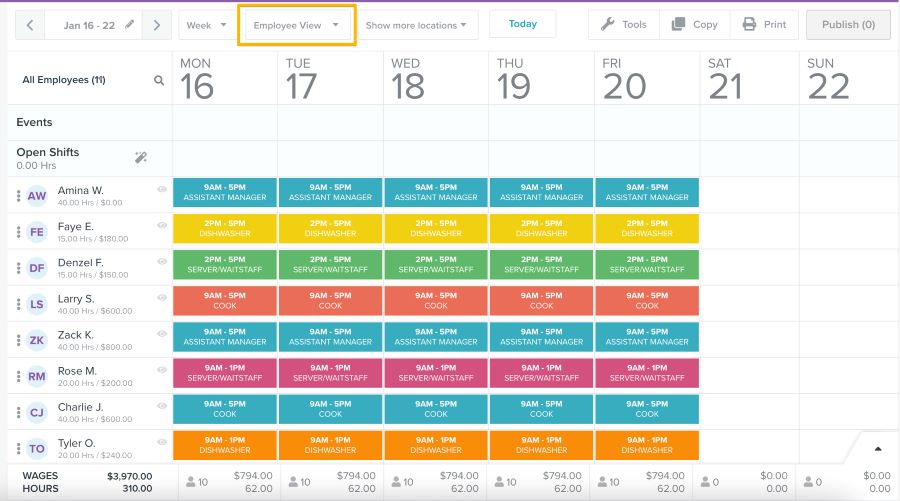
Homebase has a feature-rich scheduler that’s easy to use. (Source: Homebase)
Homebase Features
- Forecasting: Many schedulers (like Deputy or Sling) integrate with your POS to get data to forecast labor vs sales. Homebase’s Budget Forecast Toolbar goes beyond that. It can consider the weather forecast and what percentage of labor costs you want against sales. It forecasts by department so you can plan different schedules for your Outdoors and Home Goods sections. It integrates with your POS to get sales data and can average from the last two weeks for a particular day, or you can add sales manually.
- Free version: Most of the providers on this list have limited free plans, but Homebase’s free plan has all the basic tools you need: an online schedule builder, timesheet management tools, and time clock apps for tablets, computers, and POS devices. It even includes employee management solutions and integrates with POS systems, plus you can prepare timecards for payroll. It ranks No. 1 on our list of free employee scheduling software.
- Scheduling: The free plan can create templates and manage weekly schedules, while the paid plans let you consider availability and time off requests, and set open shifts. It even has automated scheduling, advanced forecasting and labor costing, and fraud-prevention functions like geofencing and automatic clock-outs. And unlike other apps on our list, the rules for breaks and overtime are already set for your state. You can add notes to each shift as well. The Plus and All In One plans also let you set PTO policies and controls.
- Employee communications: Most communications tools come with the paid plans. These include announcements, schedule notes, automated reminders, and alerts such as when employees clock in late. Employees can message each other or their team to ask about shift swapping. The Plus plan includes a manager logbook for sharing shift reports, potential issues, ideas, and more. For a complete set of communication tools in a free plan, check Findmyshift.
- Mobile app: The mobile app includes clock-in and communications tools. It rates 4.8 out of 5 with about 40,300 reviews on iOS and 4.4 out of 5 with over 17,000 votes on Android.
- HR functions and integrations: Homebase makes it easy to use its app to conduct employee performance evaluations, approve time off, see employee availability, and more. It goes further with advanced compliance support for breaks and other labor laws, HR advisers, and labor law alerts. In addition, Homebase (like 7shifts) has hiring tools. Not every scheduler on our list offers this much versatility, but Connecteam comes close. However, only When I Work and Homebase offer cash advance capability.
- Ease of use: Users give Homebase excellent scores for both the desktop and mobile versions. They say it’s easy to set up and use. Homebase alone offers customer support via phone, as well as live via chat, phone, or email. Most that offer live support do it via chat. Real-world users rated it an average of 4.56 out of 5 across multiple user review sites.
Sling: Best Retail Employee Scheduling Software for Small Stores

Pros
- Free and inexpensive plans
- Easy to use
- Sync with outside calendars
- Unlimited locations and employees per plan
Cons
- Free version does not allow shift swaps
- Only the most expensive plan has auto-scheduling
- No time clock in the free version
Sling Pricing
- Free: Shift templates, schedules, and alarms, shift availability, time off requests, news sharing, mobile, unlimited everything
- Premium ($2/user/month): Free Plan + mobile time clock, timesheets, early clock-in prevention, shift swaps, messaging, budgeting, overtime tracking, Google calendar sync
- Business ($4/user/month): Premium + auto-assigning, kiosk time clock, reports, salary support, no-shows, late arrivals, task management, dedicated account manager
Although Sling is a good scheduling software for larger retail stores, its by-employee price point (the cheapest on our list) makes it an especially good choice for stores with fewer than 12 employees, particularly those with multiple locations. It offers strong scheduling tools, especially for task lists, and its easy-to-use app has a mobile time clock.
Why fewer than 12 employees? We compared pricing vs features and found that for one location, Sling does nearly as much as the others on our list that charge by location.
Sling’s employee scheduling and management tools help you handle your employee’s shifts and stay compliant with labor laws, monitor overtime, and set up tasks for common chores, such as opening. In addition, it integrates with multiple POS systems. You can turn any device into a time clock kiosk, track hours, and keep employees informed. Overall, it makes running a store simpler.
It earned 4.68 out of 5 in our evaluation, with perfect marks for pricing, scheduling tools, and reporting. It would’ve scored higher if it offered live phone support and an offline mode.
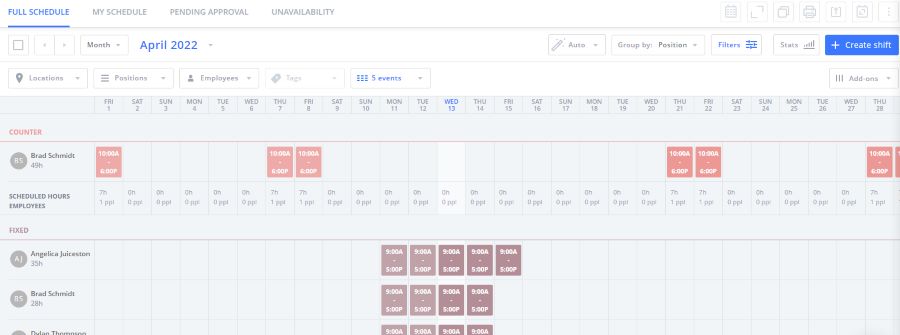
Sling’s scheduling software is feature rich. You may need time to learn all the options. (Source: Sling)
Sling Features
- Task features: While Connecteam, SocialSchedules, When I Work, and Homebase have lists, Sling has a task management feature that follows SMART management theory to help you create tasks that are specific, measurable, attainable, relevant, and timely. You can make task lists for common activities like openings, closings, or setting up new displays. Then, you can assign these tasks to individuals or teams, who can get manager feedback once completed. Create and save task templates for later use if it’s a recurring activity.
- Scheduling: Like with most scheduling apps, you can create schedules for multiple locations and save them as templates to make future schedules a breeze. The scheduler tracks unavailable hours, such as restricted hours for minors, and warns you if you accidentally schedule someone when they can’t work. The Business plan lets the software automatically assign shifts based on availability and qualifications (others on our list have this in all plans). The time tracking app, which includes geofencing and limits on clock-ins and automatic clock-outs, lets people clock in and out from their phones.
- Employee communications: Unlike others on our list, Sling does not have text messaging but handles communications through Sling messaging and an interactive news feed. You can use the function to share announcements like a new policy or a sales technique. Employees can use the app for shift swapping, plus get reminders about upcoming shifts and to clock in and out.
- Mobile app: Sling has one of the better-rated mobile apps, with few complaints, and was overall considered easy and dependable. It earned 4.7 out of 5 with around 23,500 reviews for iOS and 4.4 out of 5 with about 5,700 votes for Android. It had multiple glitch complaints in December and January, but the app was updated in February 2023.
- HR functions and integrations: Like most schedulers, Sling takes the time tracking data and makes it into time sheets that managers can approve and export to your payroll processor or as an XLS or CSV file. However, unlike most of the other apps, Sling’s mobile app lets you manage payroll reports too. It does not offer as many integrations as Deputy or 7shifts, but it integrates with Gusto, Square, Shopify, ADP, and others.
- Ease of use: Managers and employees said Sling is easy to use and gave it a solid 4.51 out of 5 stars, which is about average for those on our list. The illustrated how-to articles and video tutorials make it easy to learn, but support is only by email.
Deputy: Best Retail Scheduling Software for Integrations & Forecasting

Pros
- Free plan (US only) and reduced price for stores with a small percentage of staff on schedules
- Good customer service
- Auto-scheduling and forecasting ability
- Highly rated mobile app
Cons
- $25 minimum per month
- Forecasting is only in the Enterprise plan
- Free plan limited in features; only 100 shifts/month
Deputy Pricing
- Free 31-day trial
- Starter (Free – US only): 100 shifts/month, 100 time sheets/month, PTO management, newsfeed
- Premium ($4.90/user/month)*: Starter + unlimited shifts and timecards, auto-scheduling, payroll integration, tasking, reports, swap shift, performance, time clock
- Flexi ($2.50/active employee/week, 50 cents/inactive employee/week): Same features as Premium; best if <50% of employees are active at a time
- Enterprise (Custom): Premium + advanced demand planning and analytics, training, location procedures
- Scheduling only ($3.50/user/month)*: Unlimited shifts, auto-scheduling, PTO management, newsfeed, tasking
- Time and Attendance only ($3.50/user/month)*: Unlimited time sheets, payroll integration, POS integration, PTO management, newsfeed tasking
*$25 monthly minimum
Deputy is a popular app and with good reason. It earned a score of 3.98 out of 5 on our general scheduling software guide because of its ability to handle multiple locations and roles. For retailers, we like the forecasting tools, including analytics, that help you determine minimum shift needs. The system also offers over 50 integrations, with more variety than others on our list, plus an API.
Its scheduling and time clock tools make it easy for retail managers and employees to create and keep their shifts. The rules-setting helps you stay compliant with labor laws, such as those for minors, and can alert you when you schedule people for overtime or clopenings. Shift notes let you set tasks to help employees meet standards, and forecasting and shift analysis help ensure you have the optimum labor. You can also track wage costs to guard against losing your profit in labor costs.
Since Our Last Update
Deputy has added or improved multiple features to enhance user experience. Some apply only to specific countries. Here are just a few:
- Archive team members using the mobile app
- Map clock-ins on mobile to make approvals easier
- Improved integration with ADP Workforce now for pay rate mapping and more
- Export onboarding details to CSV
- Added a pay comparison report
- Newly rebuilt web-based time clock
- New bulk import tools to allow employee pay rates and training
- Payroll ID (for Enterprise Plan)
- New schedule interface that includes an overhaul of the drag-and-drop tool
- Shift popover for changing details
In this evaluation, Deputy scored 4.66 out of 5. The by-employee pricing plan can be more expensive for larger corporations, but it offers excellent auto-scheduling and forecasting tools. Unlike most on our list, it has a monthly minimum spend of $25. Compare this to Connecteam, which charges $29 for the first 30 users.
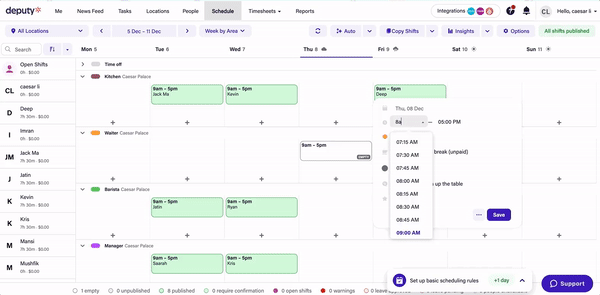
Deputy updated its interface for 2023 with popup menus and a more modern design.
(Source: Deputy)
Deputy Features
- Flexi Plan: Deputy is unique among those on our list for offering a reduced-price plan for businesses that have periodic surges or part-time shifts with larger off times, like purchase-and-install companies. Your active employees are only $2.50 per month, while inactive employees can be maintained for 50 cents per month. Only Zoomshift has a stronger seasonal program by allowing you to “turn off” scheduling for months at a time.
- Forecasting: Deputy’s forecasting tools make it easy to predict staffing needs based on trends in sales, deliveries, appointments or reservations, and other signals that you create. While Homebase tells you the cost-benefit of the staff you planned, Deputy analyzes the information to help you determine the minimum staffing for a shift. It lets you schedule people at the right level for your needs. Unfortunately, it’s only available in the Enterprise plan. If you want more basic tools, Homebase offers them in all plans.
- Scheduling: Deputy’s scheduling tools include drag-and-drop shifts, template creation, and rules for break times, work hour restrictions for minors, time off, breaks, overtime, and more. Once you set up the rules and employees, the auto-schedule will create a schedule to meet the rules, availability, and position requirements. The time clock includes geofencing. Managers can also see who’s on shift, on break, and late. It uses the time punches to create time sheets for managers to approve and syncs them with your payroll software.
- Employee communications: Like most scheduling apps, Deputy has a social-media-style chat function so you and your employees can send updates, make comments, and collaborate. However, it also has read notifications so you know who got the message. Workers can make shift trades, and Deputy will ensure only qualified candidates can accept.
- Mobile app: Deputy earned general praise for the mobile app, with no real trends and few complaints. It earned 4.8 out of 5 with about 2,500 reviews for iOS and 4.7 out of 5 with around 12,700 votes for Android. Of special note is that it had the fewest complaints about glitches.
- HR functions and integrations: Many schedulers will create time sheets, but Deputy makes payroll easier by setting up wage calculations by rate, role, and overtime. For Fair Workweek compliance, Deputy lets you record schedule amendments, calculate the required predictability pay, and capture employee consent to the change. It integrates with over 50 applications, from POS to business software, and has a REST API for creating your own integrations. A few user reviews said they had issues with integration, but they recently improved their API documentation and the ADP integration.
- Ease of use: Real-world users gave Deputy an average of 4.49 out of 5 stars, which is good, but low-average for this list. Employees especially liked how easy it was to swap shifts with the app and use the time clock. Some people in recent months have had bad experiences with customer support. If you need help, you can find videos, a good selection of how-to articles, and unlimited 24/7 year-round chat support.
7shifts: Best Retail Employee Scheduling App for Multiple Locations

Pros
- Easy to use
- Free plan
- Additional features a la carte
- Compliance and overtime rules
Cons
- Plans limit employees
- Lower plans have limited functions
- Live support is by scheduled callback
7shifts Pricing
Since Our Last Update: 7shifts has removed the appetizer plan and changed the others
- 14-day free trial
- Comp (Free): Single location, up to 30 employees, scheduling, time off, time clock, team chat, hiring tools, employee engagement tracking, POS integration
- Entrée ($34.99/location/month): Comp + schedule templates, unlimited scheduling, labor budgeting and sales forecasting, time tracking, sales and labor reporting, read receipts
- The Works ($76.99/location/month): Entrée + unlimited employees, weather, stations and advanced budgeting, labor alerts, manager log book, payroll, compliance tools, advanced reporting
- Gourmet ($150/location/month): The Works + operations overview, machine learning auto-scheduler, task management, onboarding and implementation services, payroll integrations, account management, labor forecasting and recommendations
7shifts is worth a look if you have a high-turnover workforce or run schedules for multiple locations. Like Homebase, it’s priced per location but limits employees for its Comp (free) and Entrée plans. However, its tools, which let you schedule individually and compare data across different stores, make it worth the price.
While built for restaurants, we think 7shifts’ feature set and pricing also make it a great choice for retail. 7shifts integrates with over 25 POS systems, including Revel, Square, and Clover. Its hiring function lets you set up job ads, manage candidates, and save information, making it a great tool for this high-turnover industry. The scheduling and time clock are easy to use for employees of any experience. If 7shifts is too “restauranty” for you, however, consider Sling or When I Work, which also had excellent scores for their retailing scheduling app on both Android and iPhone.
It scored 4.52 out of 5 in our evaluation, with a perfect score for popularity and 4+ scores elsewhere. Its limited live phone support and lack of auto-scheduling in lower plans hurt it.
Since Our Last Update:
7shifts has added some new tools:
- Employee onboarding—US and paid plans only
- Add employee’s birthday to their profile
- Calendar sync for Google and Apple calendar
- Holiday hours contribute to overtime now
- Task summary widget to give a quick-glance and detailed breakdown of task list completion
- Certification types and reports (Works and higher plans)
- Improved dashboard comparisons for sales and labor data
- Multi-department views in the Day View window
- Bulk task tagging
- Flagging minors on the schedule (paid plans)
- Task notifications
- Lock a pay period

7shifts is designed for restaurants but offers great tools for retail. (Source: 7shifts)
7shifts Features
- Multilocation tools: The scheduling feature lets you create independent schedules for each location, an asset when you have a brick-and-mortar store downtown but a kiosk in the mall. Managers and HR can access one or more locations as you designate. While the others on our list also handle multiple locations, the Operations Overview Add-On makes it easy to compare multiple locations’ sales, labor, and employee engagement data so you can determine where to put your attention and best workers.
- Scheduling: 7shifts’ rules-setting monitors work-hour restrictions, overtime rules, and more to help you create a perfect schedule. Unlike Deputy or Homebase, 7shifts only has auto-scheduling in its highest plan (Gourmet). 7shifts’ free time clock app records punches when Wi-Fi is down to update the system later. You can create rules to prevent early clock-in, add geofencing, or set photo clock-ins to prevent time fraud. If someone misses a punch, managers can edit.
- Employee communications: Employees can use the app to request shift swaps or time off. They can change their availability as well, a good tool if you hire college students. Managers can approve time off and update the schedule easily. The app includes reminders for shifts and to clock in, and you can send out announcements for company events like training or news like an upcoming sale. The app also allows for videos, which only a few (like Deputy) allow. In addition, there’s a manager logbook so managers can communicate between shifts, track issues, bring up problems, and keep a history of the store.
- Mobile app: 7shifts has solved its glitching issues and has few complaints. It scored 4.8 out of 5 with about 1,300 reviews for iOS and 4.6 out of 5 with around 4,700 votes for Android.
- HR functions and integrations: The rules-setting lets you keep compliant with federal and state labor laws as well as meet your own industry standards. Managers can view and edit time sheets, and missed or late shifts are flagged. You can also set up feedback surveys after each shift to make sure you identify problems before they boil over. In addition to POS integrations, it connects with 17 payroll systems like QuickBooks, Gusto, and ADP, making payroll easier. Deputy offers about as many integrations but in a greater variety.
- Ease of use: Users across multiple review sites gave it an average of 4.69 out of 5 stars, the second-highest rating of those we reviewed. Managers and employees loved the intuitive interface and praised the customer support team—notable, considering support is only available by ticket. 7shifts has videos and illustrated how-to articles.
When I Work: Best Retail Scheduling Software With On-Demand Pay

Pros
- Clair on-demand pay option
- Robust employee scheduling and time management features
- Beginner-friendly
- Auto-scheduling
Cons
- Limited reporting
- No phone support
- Time clock costs extra
When I Work Pricing
- 14-day free trial
- Essentials: $1.50 per user monthly
- Messaging, time off management, document storage, auto-scheduling, templates, multiple schedules, tags, rules, shift swapping
- Essentials + Time & Attendance: $3 per user monthly
- Essentials + time clock, time sheets, overtime alerts, break management, reminders, prevent early clock in, labor reports, POS/payroll integrations
- Clair on-demand pay via mastercard (fee-free cash advances, spending and savings accounts)
- Pro: $3 per user monthly
- Essentials + advanced scheduling rules, custom reports, labor sharing, API
- Pro + Time & Attendance: $5 per user monthly
- Pro + Standard Time + custom attendance reports + Clair on-demand pay
When I Work is a popular scheduling software with over a million users in hundreds of thousands of businesses. It offers smart auto-scheduling, overtime alerts, break reminders, and more. The highly rated mobile app lets employees see schedules, request time off, swap shifts, and communicate with each other and management.
It integrates with POS and payroll software, but its real standout is that it works with Clair to provide pay cards and allow employees to get cash advances on their pay. Even if you already have payroll, if you’d like to offer pay cards and your payroll service doesn’t offer them, When I Work has you covered.
When I Work earned a solid 4.06 out of 5 on our rubric. Its highest tools were for scheduling and popularity. It lost points because it lacks a free plan and live chat support. Some tools, like custom reports, are only available with the advanced plan, or if you add on the time-and-attendance tool (Deputy, too, has separate scheduling and time-and-attendance plans).
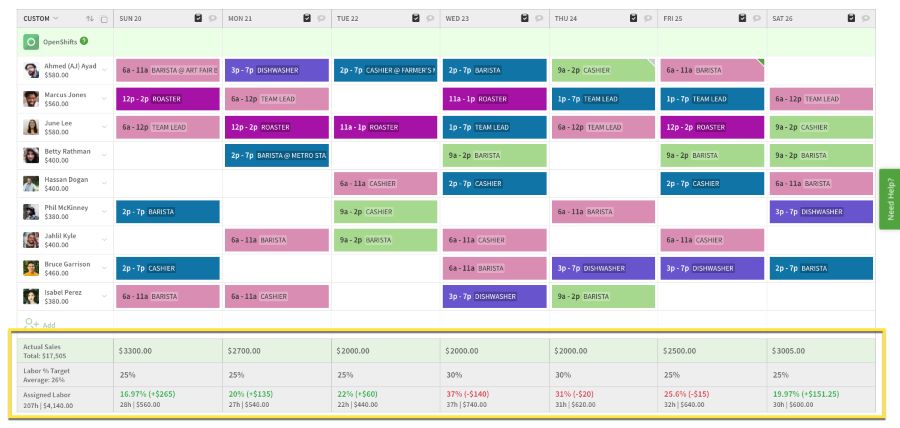
When I Work includes forecasting by sales or hours. (Source: When I Work)
When I Work Features
- On-Demand pay: When I Work stands out with its on-demand pay feature through Clair. If you get the Scheduling and Time & Attendance plan, you can offer your employees a Clair pay card. Besides receiving their pay through this card—with deposit into savings as well as spending accounts—employees can also request advances on their pay, fee-free. Only Homebase offers something similar, but its program is cash-out only and is limited to $300.
- Scheduling: While it lacks the drag-and-drop capability found in Sling and Deputy, we were impressed with the auto-scheduling capability, which can match employee availability and work qualifications to a shift. Employees can also share shift preferences online so you can see their needs when creating a schedule manually.
- Employee communications: The communications tool not only allows shift swapping but (if you include the time clock) can remind employees about lunch breaks and when breaks are about to end. Like most on our list, it allows for team messaging, one-on-one communications, and shift swap requests.
- Mobile app: This app tied with 7shifts as the best, with 4.8 out of 5 from about 23,500 reviews for iOS and 4.7 out of 5 with over 56,000 reviews for Android. Users said it was very convenient, and we liked that When I Work responds to all comments.
- Ease of use: Users on third-party review sites like Capterra and G2 give When I Work 4.46 out of 5 stars—high for this type of software in general, but not as high as most on our list. Users said it’s easy to use, but sometimes glitches. It has a useful help section, but you need to submit a ticket or contact support via chat if you need help.
SocialSchedules: Best Retail Employee Scheduling Software for Part-time Employees

Pros
- Free plan
- Tools for labor law compliance
- Mobile scheduling
- Paid plans include manager logbooks
Cons
- Limited storage on the basic plan
- No time clock in the starter plan
- Users say mobile app glitches
SocialSchedules Pricing
- Free 14-day trial
- Basic (Free): Mobile app, scheduling, messaging, availability and PTO management, 10 workers, 1 location
- Starter ($15.99/month/location): Basic + unlimited workers, multiple locations, overtime tracking, manager logbooks
- Premium ($39.99/month/location): Starter + time and attendance, POS/payroll integration, labor law compliance, certification management, advanced reports
- Enterprise (Custom): Designated support contact, custom API, custom reports, custom features
Not every store can afford full-time employees at living wages. We like the availability functions of SocialSchedules—particularly the ability to set multiple availability sets—because they accommodate the changing needs of a part-time worker, student, or even a full-time worker with regular obligations. It also has strong compliance tools, certification tracking, and break enforcement.
It earned a spot in our guide to the best restaurant employee scheduling software, and many of the features that gave it a top score there work for retail as well. Start with tools that create a schedule your employees can depend on. Then, set mandatory meal and rest breaks, so you don’t have all your cashiers clocking out at once. Manage time theft with clock-in rules, and provide strong communication so that your employees know when to work and what they need to do in a shift.
Scoring 4.06 out of 5 in this evaluation, its free plan and free trial boosted it in our pricing criteria. It took a hit for reports not being customizable and the lack of live phone support.
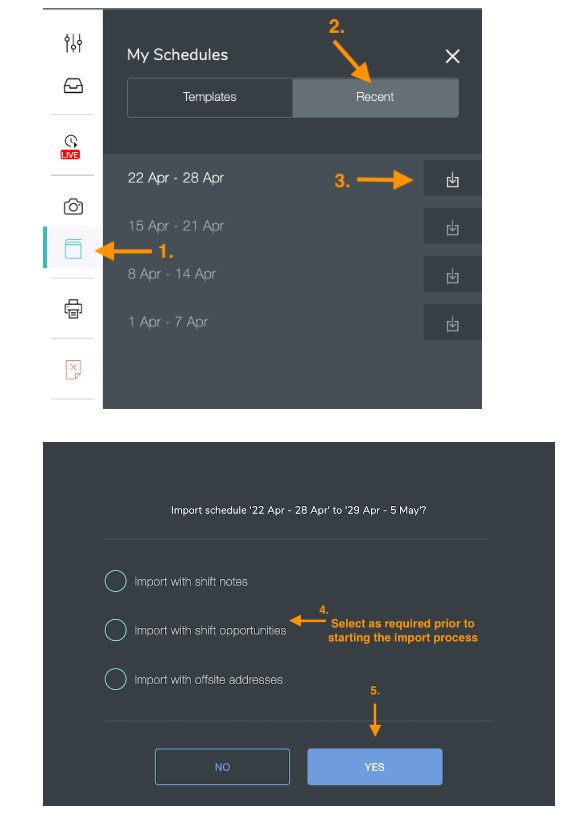
Social Schedules is an easy-to-use scheduling program.
(Source: Social Schedules)
SocialSchedules Features
- Custom availability and shift lock-down: While other apps on our list allow employees to set availability, SocialSchedules alone lets employees create multiple availability sets with their own start and stop dates. This is a handy feature for stores that employ students or part-time workers with second jobs that may also have shifting schedules. The lock-down function lets you freeze a schedule, so no one scheduled can take that day off, such as for Black Friday. Most on our list have this blackout date function, although we did not find it for Connecteam or FindMyShift.
- Scheduling: Like other scheduling software on the list, SocialSchedules has templates and editability. You can adhere to federal and state laws concerning overtime, breaks, and work hours by setting the rules in the SocialSchedules software. Even when auto-scheduling, it will keep these parameters in mind. With POS software integration, you can see sales trends to help you schedule employees according to demand.
- Employee communications: You can send employees their schedules and announce open shifts. Employees can accept shifts on the app or request trades. There are individual and group chats that allow announcements, and there’s a manager’s logbook for tracking receipts, sharing images, and loading documents. Managers can send push notifications and get read receipts, similar to 7shifts.
- Mobile app: The app earned 4.6 out of 5 with about 550 reviews for iOS and 3.8 out of 5 with around 440 votes for Android. These are lower scores than most on our list, especially for Android.
- HR functions and integrations: Managers can track certifications, whether it’s health standards for people selling food or training for the products your company specializes in. While Deputy and Connecteam have some compliance tracking, the certification tool stands out. You can run reports to see how the staff is performing—whether it’s in how well they follow closing procedures or whether they are taking breaks as required. These can be saved to prove compliance with labor laws. You can also approve time cards on the app and import them to your payroll software.
- Ease of use: Users, on average, gave it 4.5 out of 5 stars across multiple user review sites—which is typical for this kind of app. Managers and employees praised the ease of use. You’ll find illustrated how-to articles on the website and can reach a live person via chat—although they may email you a reply. The Enterprise plan offers dedicated live support, and there are setup services available.
Connecteam: Best Retail Employee Scheduling Software for Employee Tasking & Training

Pros
- Super easy to use
- Get training and certifications tracking
- Free plan
- Task delegation
Cons
- No live support
- No auto-scheduling
- Limited integrations
Connecteam Pricing
Since Our Last Update: Connecteam has reduced its prices but also the number of users included.
- 14-day free trial
- Small Business (Free for 10 employees): Track hours, manage schedules, communicate, delegate tasks, train team.
- Basic ($35/month for 30 users + 60 cents/user/month): Free + reports, GPS, unlimited jobs, payroll integration, communications includes media, filter days for >30 days
- Advanced ($59/month for 30 users + $1.80/user/month: Basic + geofence in time clock, smart groups, templates, advanced settings, customization, advanced filtering
- Expert ($119/month for 30 users + $3.60/user/month): Advanced + breadcrumbs location tracking, custom reports, automated limitations, in-app links, onboarding, multibranch/multilocation management
- Enterprise (Custom): Account manager, enhanced security, API, personalization, branding, biometric clock, and more
Connecteam has two other products that go beyond scheduling. Plans run from $35 (for 30 users) + 60 cents per additional user to $119 for 30 users + $3.60 for additional users. Sign up for annual pricing and receive an 18% discount on all plans.
Advanced communications: Chat, directory, email, surveys, and more
HR & skills: Courses, quizzes, documents, employee recognition, rewards, celebrations, time off tracking, and more
Connecteam earns a place on our list because of its communication, delegation, and training tools. Retailers use the platform for automating activities, like opening or closing and end-of-day cash reporting, with online checklists integrated into the schedules (managers can view checklists in real time as tasks are being completed). With the ability to attach files, photos, and voice recordings to tasks and subtasks and create custom courses, it works well for training and enforcing standards, onboarding new employees, and more.
It’s the most expensive on our list, however, if you want all the great communications and training tools. The Operations plans (which include scheduling and time clocks) start at $35 per month for the first 30 employees. However, it comes with limited access to the employee chat, events, directory, course, documents, rewards, and other tools. For advanced tools, you need separate plans or a custom plan. It’s worth considering if you have a high-turnover workforce or need to train employees on products.
It scored 4.03 out of 5 in our evaluation, with scores over 4 in pricing, scheduling, and popularity. It took hits in reporting and ease of use because customized reports are not in every plan and it lacks an offline option and phone support.
Since Our Last Update:
Connecteam has added some new features:
- Customized shift notifications to alert specific employees of shift changes
- Team chat now has descriptors
- Automatic expiration reminders for documents that need updating
- Additional overtime options in the time clock
- Celebrations feature to track birthdays and work anniversaries
- Updated look for employee information pages with custom fields
- Manage quick tasks from the desktop as well as mobile
- Team recognitions tool
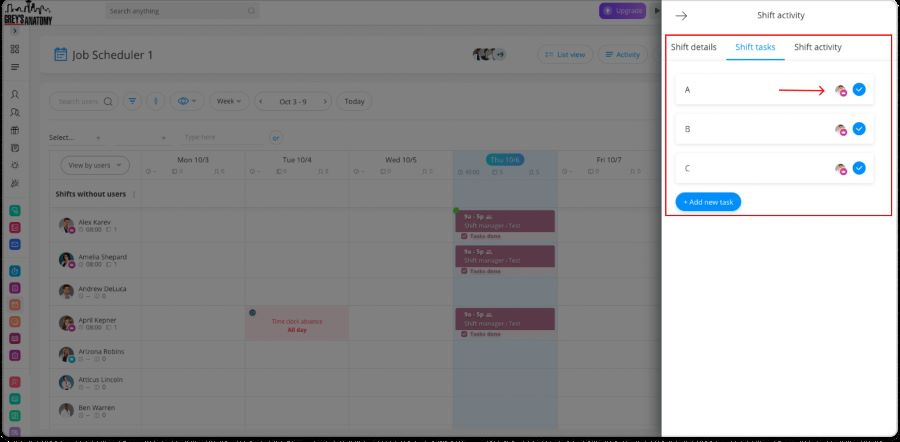
Connecteam has an easy-to-use shift notes tool right on the scheduler. (Source: Connecteam)
Connecteam Features
- Task tools: Connecteam’s task tools go beyond the standard notifications. Employees can update as they finish tasks, and managers see these updates in real time. Advanced plans include subtasks as well. In addition, you can attach files, photos, and voice recordings, and even create forms. Now, you can create reminders to make sure employees update documents (or read and sign off on training). It makes it a great app for training new employees and making sure all the chores of opening and closing a store are done correctly. Sling and 7shifts have strong task lists, but Connecteam stands out.
- Scheduling: Connecteam’s scheduling is typical of those on the list, with templates, copy-and-paste and drag-and-drop capabilities, notes, and tasks. It also lets you set open shifts to offer employees and tells you in real time if a shift is accepted. You can set up a time clock kiosk with employee PIN codes or let employees clock in on their mobile app. The mobile app includes geofencing that can tie to a job, customer, or project. This, too, is more than the other software on our list provide.
- Employee communications: Connecteam offers push notifications, lets employees request shift swaps and time off, which allows managers to approve or decline on the spot, and has group and individual messaging. Group chat can be set with rules for inclusion so someone in the warehouse can’t join the payroll chat, and someone who is let go is automatically removed from the group. You can include attachments. It also lets you create surveys and live polls to keep your finger on the pulse of the company or set up communication lines with HR or senior managers for when employees need to give more private feedback.
- Mobile app: Its mobile app received 3.7 out of 5 with about 1,600 votes on Android and 4.2 out of 5 with around 400 reviews on iOS. There were some complaints about loading and issues after an update. While these are low compared to other apps on our list, they’re still good. What’s more, the app includes many training tools, so employees can take training anywhere.
- HR functions and integrations: Connecteam’s time sheets flag the important items for managing payroll: breaks, overtime, and alerts when an employee goes over a daily work hour limit. It also excels in training features, with the ability to create custom courses, a great tool for getting your employees up to speed on new products or procedures. You can use the tools for onboarding new employees as well. Like Homebase, it has hiring tools. Connecteam also allows you to create a library, where you can hold the employee handbook, catalogs, sales tips, videos on how to spot a shoplifter, and whatever else your employee might need to access quickly or study in-depth.
- Ease of use: Connecteam doesn’t have an auto-scheduler like Homebase or Deputy, but it does offer templates, copy-and-paste, and automatic reminders that make it easy to set up schedules and keep employees aware of their shifts. Users gave an average of 4.72 out of 5, the highest rating on our list. They praised its intuitive interface, saying employees of any age and skill were able to use the app.
Findmyshift: Best Retail Employee Scheduling Software for Nonprofits

Pros
- Free plan
- Can schedule devices
- Highly rated mobile app
- Discount for charities
Cons
- Team-based pricing may add up
- Plans limit the number of people
- Text messaging costs extra
Findmyshift Pricing*
- 90-day free trial
- Free: 5 team members, 1 manager, 1 week historical data, 1 week forward planning, 3 week on-screen editor, 5 facilities
- Starter ($25/team/month): 20 team members, 1 manager, 1 year historical data, 3 months forward planning, 6 week on-screen editor, 20 facilities
- Business ($40/team/month): 100 team members, 100 managers, 5 years historical data, 1 year forward planning, 20 week on-screen editor, 100 facilities
- Enterprise ($70/team/month): 300 team members, 300 managers, 10 years historical data, 3 years forward planning, 52 week on-screen editor, 300 facilities
Text messages purchased in bundles
*25% discount for charities
*Special pricing for >300 team members on a single team
We like Findmyshift for charitable organizations with retail stores because of the hefty discount it offers: 25% off any plan. The free plan is among the most limited, but the 90-day free trial gives you ample time to test out the platform. We found the interface dated but easy to use and an improvement over spreadsheets. Unlike the others on our list, which open windows into shifts, Findmyshift lets you type directly on the schedule and use a drop-down editor to make changes. It lacks auto-scheduling but does have templates, rules, and drag-and-drop editing.
Earning a score of 3.99 out of 5 in our evaluation, Findmyshift had the lowest score for scheduling tools, since it lacks auto-scheduling and strong compliance tools. However, it got strong marks in pricing and would have scored perfectly in ease of use if not for some integration limitations and limited phone support.
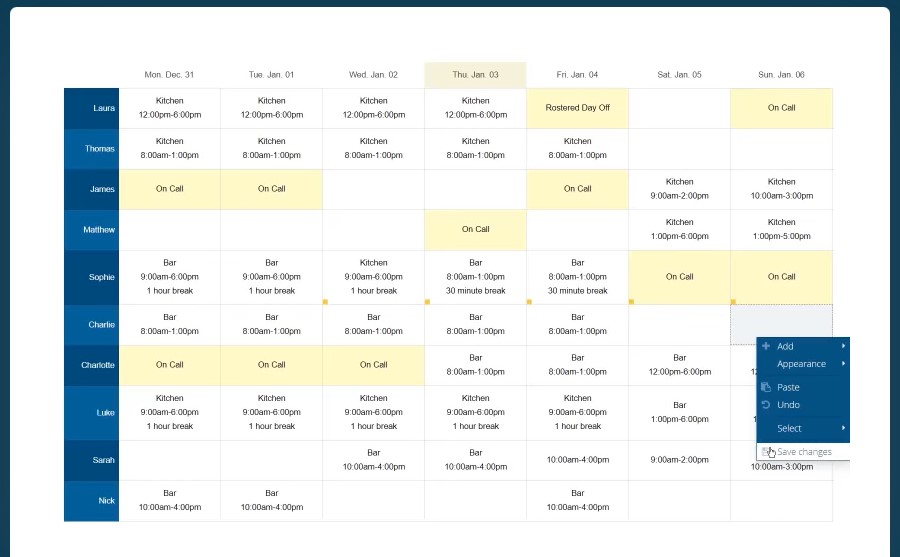
FindMyShift’s interface is older and simpler than the others on our list. (Source: FindMyShift)
Findmyshift Features
- Schedule facilities: Findmyshift alone has a special calendar just for resource and facility scheduling. While more useful for other industries, retailers might use this calendar for scheduling training, assigning equipment, or placing employees in certain areas like the floor vs behind a counter.
- Scheduling: Findmyshift’s schedules work much like a spreadsheet, letting you type in hours and breaks free form. But it also has a drop-down menu and templates. Like Zoomshift, it lacks auto-scheduling. Employees can request shift changes directly on the schedule, so managers can easily see its effect on the day. The free time clock app has an offline mode, like 7shifts. It alerts managers if an employee clocks in early, late, or not at all, and you can let Findmyshift automatically clock out employees at the time you set.
- Employee communications: The program includes automated push, shift reminder, email, and text notifications; however, the text notifications cost extra and are purchased in bundles. Other schedulers in this guide communicate through their apps rather than text. There’s a team board where you can send group communications and have conversations.
- Mobile app: Findmyshift’s app is not as popularly rated, scoring 4.4 out of 5 with about 25 reviews for iOS and 4.7 out of 5 with over 400 votes for Android. It was average for complaints with glitches.
- HR functions and integrations: You can manage time off requests directly on the schedule, including tagging the type. The rules-setting tool lets you keep compliant with federal and state labor laws for breaks and overtime pay. The time clock creates time sheets and lets you compare hours worked vs scheduled. It also has labor forecasting. If you use an independent timeclock or one included in your POS, it can migrate the data to Findmyshift’s schedule and time sheets. While simpler than Deputy or Homebase, it nonetheless has a lot to offer.
- Ease of use: Findmyshift earned a strong average of 4.6 out of 5 stars across multiple user review sites. It has an offline mode for when Wi-Fi is down, something only about half the retail schedule apps on our list include. You can find a live demo, videos, and illustrated how-to articles on its website.
ZoomShift: Best Retail Employee Scheduling Software for Seasonal Stores

Pros
- Seasonal shops can put ZoomShift on hold
- Time clock, time sheets, and payroll reports included
- Third-party calendar sync
- Tool to show employee desire to take extra shifts
Cons
- No free plan
- Minimal live support
- Very few integrations
ZoomShift Pricing
- 14-day free trial
- Starter ($2.50/user/month): Schedule, availability, time off, shift cover requests, time sheets, time clock, payroll report, automatic reminders, calendar app sync
- Premium ($5/user/month): Starter + overtime warnings, shift rules, time sheet rules, GPS time clock, activity logs
- Enterprise (Custom): Premium + priority support, white label, sub-account management, API access
No use-no charge months: Can pause subscriptions and restart with data intact.
Like Findmyshift, ZoomShift is one of the simplest scheduling software for retail to make our lineup, although it scored high for scheduling tools and reporting. It has a unique pricing plan that makes it great for seasonal stores such as ski shops, college bookstores, and stores or kiosks that open only during high tourist seasons. When your store is shut down, you can put your account on hold and not pay for those months. All the information is saved so that it’s easy to start up again. Only Deputy’s Flexi Plan comes close to allowing for seasonal highs and lows.
It had 3.88 out of 5 for scheduling tools and a perfect 5 for reporting because you can make custom reports. However, it took a hit in our scoring because it lacks POS integrations, except through API, and has no free plan. Moreover, its compliance features are not as robust as, say, Homebase and Deputy. However, users love the simplicity of it. Overall, it scored 3.86 out of 5 in our evaluation.
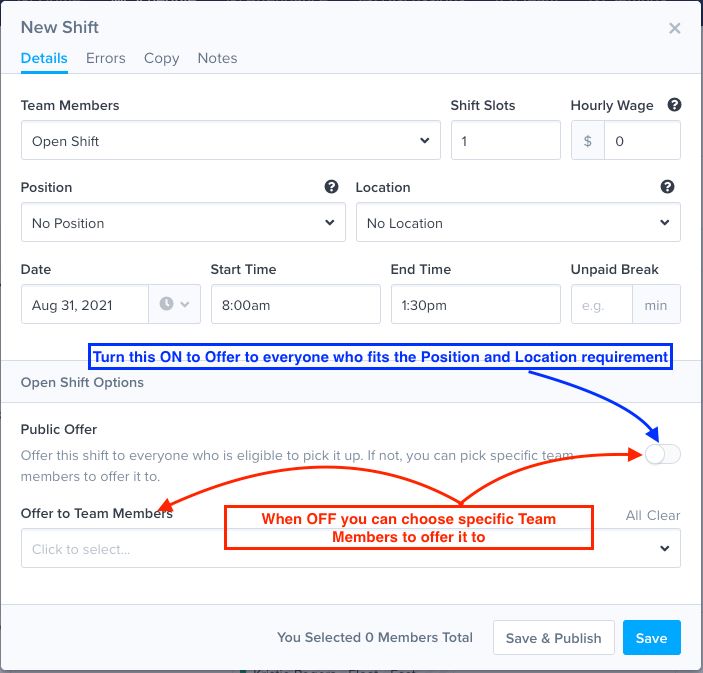
In addition to flagging errors, Zoomshift makes it easy to see employees willing to take on extra hours.
(Source: Zoomshift)
ZoomShift Features
- Employee availability: One nifty tool ZoomShift has that we did not see on other schedulers on our list is the in-schedule availability tags. If an employee is not available, it shows up as a thumbs-down, making it easy to not schedule them. However, what’s unique is that if an employee wants to take on an extra shift, they can show their availability with a thumbs-up. Other software can handle unavailability, but no other has this “willing-to-work” feature.
- Scheduling: Aside from the availability feature, ZoomShift is similar to other software with templates and copying capability. It can also manage multiple shifts for team members. However, unlike most of the software on our list, it does not include auto-scheduling. It does have a labor forecasting tool, however, and syncs with Google Calendar, iCal, and Outlook. The time tracker is integrated, making time sheets easy. You can set clock-in/out rules and geofencing, track missed shifts and late arrivals, and more.
- Employee communications: The communications tools are basic: Send schedules to workers, offer open shifts, and allow employees to trade shifts. It alerts managers about overtime and violations of shift rules (like clocking in early). It has event announcements, group chats, and direct messages. Unlike 7shifts, it does not allow you to post videos.
- Mobile app: This app ranked the lowest on our list by users, with 2.8 out of 5 from about 50 reviews for iOS and 4 out of 5 with around 200 votes for Android. Users said the app is basic, and there were reports of glitches.
- HR and payroll functions and integrations: Unlike most of the software on our list, ZoomShift does not offer many premade reports, but lets you build your own. You can approve time sheets and create payroll reports, which you can download as CSV or XLS files for putting into a payroll program. Sling and Deputy are better for regular reports and still let you customize. It only offers integration to ADP unless you use an API. For the best integrations, consider Deputy.
- Ease of use: Users across several user review sites score it at 4.52 out of 5, which is high for software in general, but just over average for the software on our list. Small businesses liked it best, saying that it was simple to use but gave them all the tools they needed. Larger businesses said it needed additional features—If that’s you, look at Homebase instead.
Humanity: Best Retail Employee Scheduling Software for Controlling Labor Costs

Pros
- Strong compliance tools
- Highly rated mobile app
- Auto-scheduling and demand forecasting
- 24/7 live chat support
Cons
- Expensive
- No free plan
- Limited integrations
Humanity Pricing*
- 30-day free trial
- Starter ($1,200 monthly + $295 setup fee): 20 employees, scheduling, shift, trade, time off management, mobile, SMS notifications
- Classic ($1,500 monthly, no setup fee): Starter + auto-scheduling, compliance, labor costing, reports, certifications, time clock with GPS, payroll export, policies, 24/7 support, onboarding for managers and leads, payroll exports
- Enterprise (Call for quote): Classic + demand-based scheduling, open API, HCM integration
*Based on a quote we received
Humanity has a strong toolset, which includes customized rules, auto-scheduling, and a platform that updates with labor laws (something we saw only with Homebase). It promotes its cost-saving features, which include demand-based scheduling, auto-fill technology, labor costing, and a conflict engine to help you maximize the cost-effectiveness of your labor.
Humanity earned a perfect score for scheduling features and reporting, putting it alongside Homebase, Deputy, and Sling. It’s a popular tool, and its mobile app had the highest rating of those on our list. What brought it to last place was pricing—thus dropping its overall rating to 3.54; you need to call for a quote, and it has no free plan.
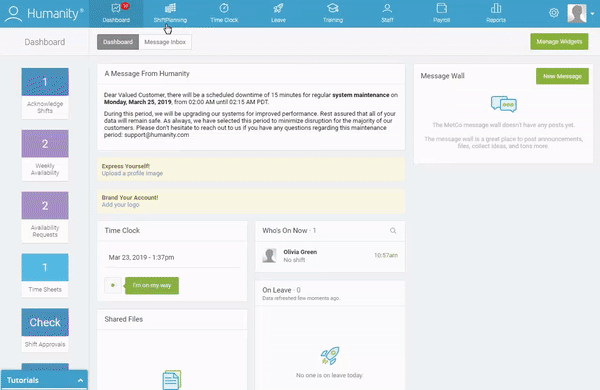
Humanity lets you add employees to the schedule by more than just name. (Source: Humanity)
Humanity Features
- Cutting labor costs: Like Deputy, it has strong forecasting features, which it takes into account while scheduling. The demand-based scheduling matches staffing against foot traffic, sales projections, and other factors. While it only comes with the more expensive plans, the auto-fill tool is impressive, taking into account labor laws (already programmed in the system), certifications, leave, and availability. In terms of function, Deputy comes close with its forecasting integration and 7shifts with its machine learning.
- Scheduling: Humanity offers templates, drag-and-drop functionality, and alerts—allowing you to avoid scheduling staff for overtime, back-to-back shifts, and clopenings. If there’s an unexpected surge in business, managers can post open shifts. Humanity has a built-in time clock, including GPS functions for geofencing and a photo function to avoid buddy punching.
- Employee communications: Humanity is pretty typical in its communications tools. You can send out schedules to employees, create notifications about shifts, and manage time off requests. While employees can trade shifts, you can set rules to ensure the replacement has the right qualifications for the job. Other apps on our list require the managers to check this before approving.
- Mobile app: Humanity’s app scored the highest ratings among users. It earned 4.9 out of 5 with about 33,100 reviews for iOS and 4.7 out of 5 with around 8,200 votes for Android. Both employees and users rave about the functionality and ease of use. Unfortunately, the Android score went down since our July 2021 update, given reports of glitches.
- HR and payroll functions and integrations: Humanity has a reasonable list of integrations, but they are for payroll or human capital management (HCM), as opposed to POS. Humanity’s rules keep you compliant with state laws on work hours, break frequency, time between shifts, and max hours (Homebase and Deputy also track local scheduling laws). It also provides predictive scheduling rules.
- Ease of use: Users on third-party user review sites gave Humanity an average of 4.3 out of 5. This is good for software in general, but lower than most of the scheduling solutions on our list. Users say it’s easy to use but requires some time to learn all the tools. Unlike most of the software on our list, Humanity offers 24/7 year-round live chat support.
How We Evaluated
To find the best retail scheduling software for employees, we first looked for the basics: good price, scheduling templates, and time clocks that make it easy for employees to punch in and out.
We chose solutions that include mobile and desktop applications, tools for managers and employees, and strong communications features. Then, we considered tools that are important to the retail industry: rules-setting for labor laws (including those for minors), employee availability creation, and shift swap capability. We also looked for tools to help with high-turnover industries, like hiring, onboarding, training, and checklists.
To view our full evaluation criteria for the best retail scheduling software, click through the tabs below.
30% of Overall Score
Nearly all the payroll software we considered offered transparent pricing on their websites, although a few had custom pricing for their enterprise plans. Some had minimum monthly spends. We favored those with a free plan, even with limited features or a reduced number of employees. Only Sling had a perfect score.
25% of Overall Score
We looked at the depth of tools: auto-scheduling, forecasting, and templates. We also considered communication tools that let managers and employees talk to each other, such as for shift swapping. Several earned perfect scores: Homebase, Sling, Deputy, and Humanity.
10% of Overall Score
We value the input of real-world users, who work with the software in myriad situations over months and years. Thus, “Popularity” takes into account the number and scores of user reviews on reputable third-party sites like Capterra, G2, and TrustRadius. We also considered the mobile apps here. 7shifts has a perfect score here.
10% of Overall Score
Reports are important not only for payroll but also for planning sales vs costs and keeping records to show compliance with labor laws. We considered the number and customizability of reports. Homebase, Humanity, Deputy, Sling, and ZoomShift all scored 5 out of 5.
25% of Overall Score
This score includes interface, customer support, online guides, and dedicated help. None of the software earned a perfect score, but Homebase comes closest with a mark of 4.75 out of 5.
Retail Employee Scheduling Software Frequently Asked Questions (FAQs)
While we’ve evaluated the best retail scheduling software based on our general criteria, you should always consider your specific needs. For example, When I Work and 7shifts have the best-rated mobile apps for employees, while Homebase also offers hiring and job posting tools. Check out our other scheduling software evaluations:
- Best employee scheduling software for small businesses
- Best restaurant scheduling software
- Best free employee scheduling software
Some HR software also comes with scheduling tools.
Scheduling your retail staff is a three-way balance of your business needs, your employee needs, and the necessities of law. You should know your business well enough to determine how many employees you need per shift and what the laws are concerning breaks and lunches, especially when employing minors. Finally, consider the needs of your employees: Does one have school? Does another need 30-plus hours to qualify for insurance?
Next, use a scheduling software or template to start assigning schedules and check with employees for feedback. Finally, post the schedule in time for employees to plan for their shifts, especially if those shifts change from week to week.
Learn more in our article on scheduling employees.
It depends on the features you need and the number of employees. Retail scheduling software prices in two ways: by location (like Homebase) or by employee/user (like When I Work). Some with by-employee pricing have a minimum number of employees or a starting price for up to a specific number of employees. Connecteam is an example of this.
Yes! We’ve even rated the best free employee scheduling software. (Hint: They are on this list, too.) These plans often limit locations or features and offer more robust plans for additional fees. In addition, you can use a template and excel sheet. Check out our article on scheduling employees to get your free template.
Bottom Line
Retailers deal with a lot of challenges, from scheduling part-time and full-time workers to keeping up with training and compliances. The best retail scheduling software not only makes it easy to assign and trade shifts and manage time off but also enables communication with workers individually or in groups, tracks tasks and compliances, and more, and charges by the employee or by location. Consider pricing vs features as you make your decision.
Overall, we found Homebase to offer the best deal for the price, especially if you have a single location. Its tools make scheduling easy and the mobile app is well-praised by users. Start using Homebase for free today.